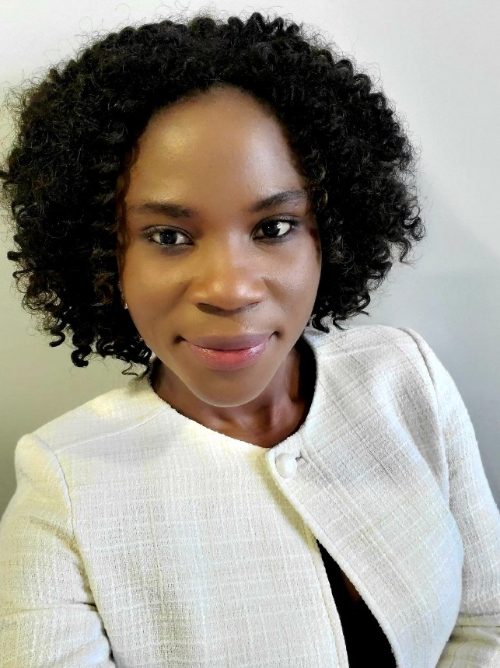CUP Graduate Student Equity Award Profile: Mary Etem Mbiatem
13 February 2023

“Whichever program we find ourselves in, it’s not the end that’s important but the whole process. It’s really about enjoying that process, balancing work with self-care, and finding a community.”
This article is part of a series highlighting the recipients of the Graduate Student Equity Award offered by the Community-University Partnership (CUP) in the School of Public Health. The award supports graduate students pursuing community-engaged research and is made possible with funding from the Suncor Energy Foundation.
Mary is a first-year PhD student in counselling psychology through the Faculty of Education. Today her focus is on public health and mental health research, but her journey has been one of many learnings and accomplishments.
She began her career in Cameroon, where she earned a Bachelor of Nursing degree and worked in a clinical setting for about four years before moving to the United Kingdom to pursue a master’s degree in public health. After graduating, she began working in the U.K. with children with disabilities.
“During my time between working as a nurse and being a researcher, I realized there was something missing. My perception of health and well-being had been really narrow. My attention was focused on physical health as opposed to mental health.”
Mary eventually moved to Canada, where she earned another master’s degree, this time in counselling psychology, from Yorkville University. She worked as a registered psychologist in Edmonton for about five years, mainly serving refugee and immigrant communities, including people experiencing the effects of conflict-related trauma. One of her primary research interests is trauma experienced by survivors of the Rwandan genocide.
She started her current program at the U of A in hopes of both refining her clinical skills and contributing to psychological research around immigrant and refugee experiences.
“I’ve always been very interested in community-based research, but since coming to Edmonton, my interest has grown even more. When I started working with newcomer and refugee populations here, it became clear that they are not accessing health services provided to the general public, which is due to stigmas around mental health and different linguistic and cultural barriers.
“Now, I see myself being in a place where I can build up my toolbox to work specifically with ethnocultural communities. There’s also part of me that wants to give back to communities in Edmonton, coming from an immigrant background myself.”
An aspect of the PhD program Mary finds particularly valuable is that it gives her a chance to connect research and theory to practice.
“One thing that’s been striking for me is that, although I’m confident in my skills as a psychologist, my program has taught me ways of grounding interventions in an evidence base and working within different knowledges or theories. I’ve had a chance to tap from various modalities to see how they fit my style of practice.”
As a participant in CUP’s community of practice sessions, Mary also has a chance to connect with fellow students interested in community-based research. At the start of her program, classes were hybrid because of COVID-19, which left many students feeling lonely and isolated. She said the sessions helped her feel connected with others at a human level.
“It’s been wonderful. The community of practice is a place where you feel that sense of belonging and connection. It has been a resource. There’s not a set agenda. The space is really about helping you see your own transformation throughout the process. It doesn’t feel like extra work. That’s the beauty of it.”
She says the sessions reinforce values that are important when engaging communities.
“One thing we talked about, for example, is decolonizing mental health. We discussed how it is important to build trust with communities and not impose your own agendas. That can be tricky, especially when we are working on various timelines with different goals, but we can easily sever relationships with communities by trying to impose an agenda. So it’s been a good reminder to honour these ethical principles when engaging with communities.”
At the beginning of the sessions, participants were encouraged to bring in something that speaks to who they are. Mary decided to create an art piece of a butterfly with the idea that, at the end of her program, she will see who that butterfly becomes.
“Ultimately, this program is about my own transformation and coming out a better clinician and researcher, or a better lecturer if I choose to remain in academia. I feel like I have many options and choices, and it just feels nice to have choices.”